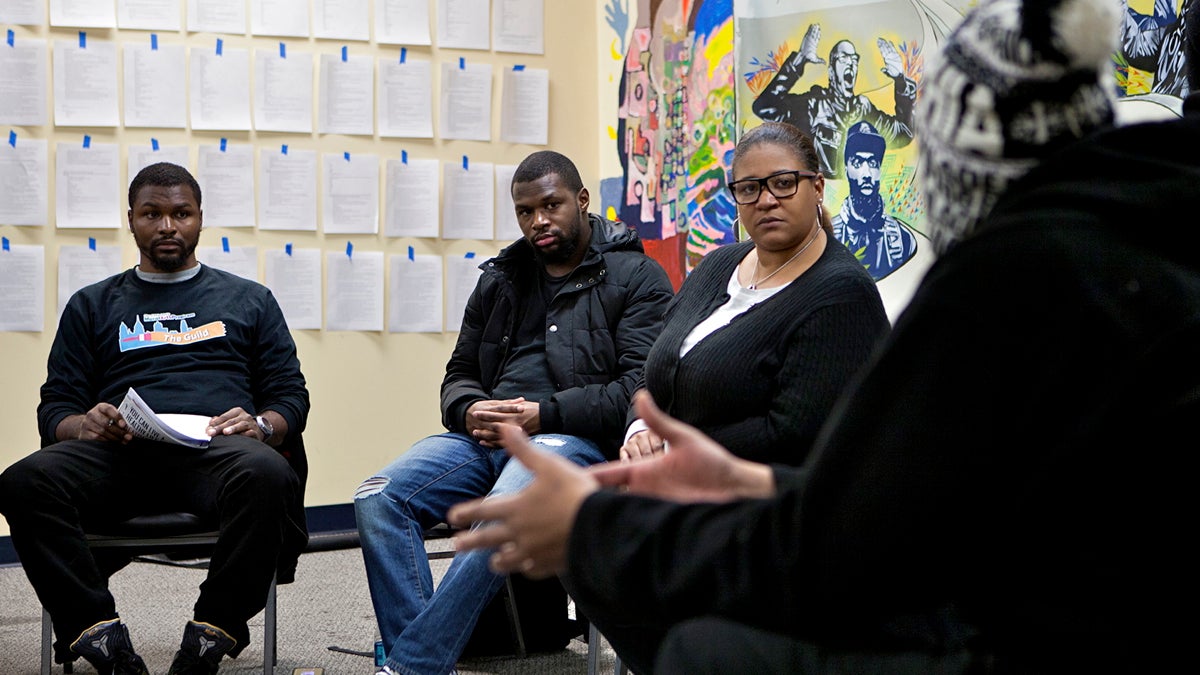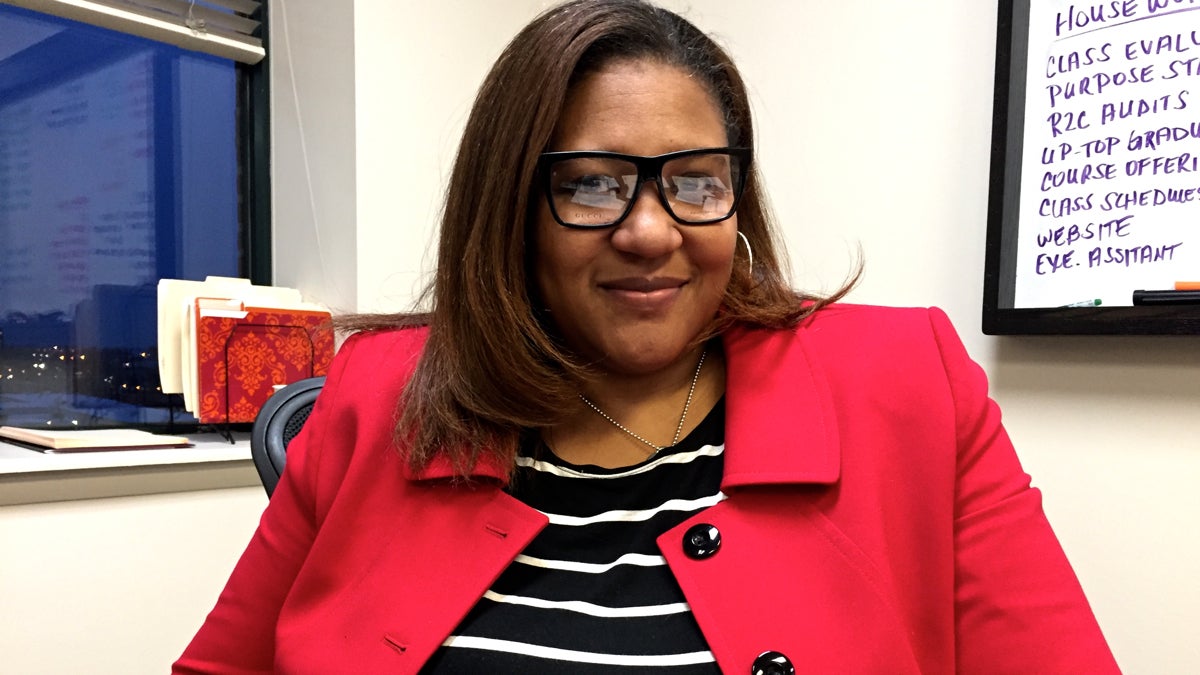Former prisoners offer advice to new leader of Philly effort to help ex-inmates
Listen
Ceciley Bradford-Jones
On a recent December morning, Ceciley Bradford-Jones takes a seat in a circle of foldout chairs filled with people who are experts when it comes to prison; they’ve lived behind bars.
WHYY is one of 15 news organizations in the Philadelphia Reentry Reporting Collaborative, a solutions-oriented focus on the issues facing formerly incarcerated Philadelphians. The aim is to produce journalism that speaks, across the city and across media platforms, to the challenges and solutions for reentry.
—
On a recent December morning, Ceciley Bradford-Jones takes a seat in a circle of foldout chairs filled with people who are experts when it comes to prison; they’ve lived behind bars.
Bradford-Jones, the new executive director of RISE, the Philadelphia Mayor’s Office of Re-integration Services, has been on the job for a couple months. She’s on the second floor of this Center City office building because she wants to know how she can improve her program — directly from the source.
RISE, created during the Street administration, hasn’t always had the most stellar reputation among former inmates. Bradford-Jones is on a mission to change that. And she thinks having them inform that process can help.
They do too.
Aaron — whose last name we’re withholding to avoid undermining any legal efforts to clear his criminal past — spent five years in prison for aggravated assault. After getting out in 2012, he went to RISE.
It wasn’t a good experience, in part, he said, because he thought the office lacked a personal touch.
“It wasn’t about people, about helping people specifically. I felt like it was more of a like a robot type of thing,” he says. “The best word I can use to explain it is just like a shell. You know, like it didn’t really have any substance.”
 Faith Bartley, a former inmate and an outspoken advocate for women in re-entry, offers her insights at a Re-entry Think Tank meeting. (Aaron Moselle/WHYY)
Faith Bartley, a former inmate and an outspoken advocate for women in re-entry, offers her insights at a Re-entry Think Tank meeting. (Aaron Moselle/WHYY)
Joshua, another ex-offender, has also had his share of letdowns since he was convicted. Especially around finding employment — easily the top concern and biggest challenge for people with a record. He wants RISE to do a better job of connecting people to opportunities that could actually lead to a job.
“I can send a man to any store, to try to get a job, but if he has a felony, that’s automatically a no-no. I know dudes who are very intelligent that can say everything. Once they see the felony, the door is closed,” he says.
Lending their voices to help others down the line
Aaron and Joshua are two members of the Re-entry Think Tank, a group of former inmates who are pushing for people like them to have a say in the city’s efforts to help its sizable ex-offender population. Up to a third of Philadelphia residents have a criminal conviction.
It’s why Bradford-Jones is so driven to make her office a different kind of city department.
“This isn’t licenses and inspections. This isn’t the water department or the sewer department where there is a thing that you do. I’m looking at RISE as the people that we help,” she says inside the Institute for Community Justice.
In his 40s, Colwin now works for a program run out of the city’s court system that seeks to break the cycle of recidivism. Before that, he spent nearly two decades behind bars on a robbery conviction.
In a deep, gravelly voice, Colwin tells Bradford-Jones that RISE should send people like him to the prisons to talk to inmates face-to-face about what the office can offer once they’re out. Especially, when that day is in the distance, when it doesn’t seem real just yet.
“Then, at least, people have a beacon of light at the end of the tunnel. You wouldn’t be thrust back into society,” says Colwin, whose last name is being withheld to avoid undermining any legal efforts to clear his criminal past.
Bradford-Jones nods. It’s one of the changes she wants to make. Many are scribbled, in one form or another, on a big white board inside her office above Spring Garden Street.
 Ceciley Bradford-Jones of the Mayor’s Office of Re-integration Services. (Aaron Moselle/WHYY)
Ceciley Bradford-Jones of the Mayor’s Office of Re-integration Services. (Aaron Moselle/WHYY)
The entire rainbow of dry-erase markers is on display.
“I haven’t erased anything since last week. That’s the scary part. I’ve only added things,” says Bradford-Jones during an interview.
Working toward meaningful employment
When it comes jobs, Bradford-Jones wants RISE to spend more time helping people get positions that feed their soul, not just their families, even if that can’t happen right away. She says that will stop former inmates from returning to the streets, but also, hopefully, future generations from ever taking that path.
“If mom and dad would come home, tired as hell still, but at least they have a good story to tell about work or something happened to them or some enjoyment in their day, that will go a long way in kind of building up the idea that work is OK, work is all right, work is actually good sometimes,” she says.
Bradford-Jones also wants to add more caseworkers to her staff so RISE is more centered around helping ex-offenders long-term rather than simply being a place where people’s problems are “triaged” on an emergency basis.
But because the vast majority of people come to RISE voluntarily, Bradford-Jones says it’s up to her office to make people want that type of relationship, to make the office somewhere people want to be. She says that all starts with the attitude her caseworkers — really, anyone in her office — exude.
“How I talk, how I act, how I sit, how I communicate, is a reflection on them, on how I feel about them,” she says. “If I’m slouching, popping gum, or not giving you eye-contact, you assume that I don’t care.”
Searching for sense of optimism
That could be a big problem for RISE’s reputation, but, more importantly, for the people the office is trying to help.
Life with a criminal record is often incredibly frustrating and, at times, fragile. Keeping people from feeling discouraged is key.
Aaron says RISE has to be a source of hope because there’s potentially a lot at stake.
“If it remains to be a shell, that drives recidivism. That drives people, not necessarily like myself, but drives returning citizens to try to go down other avenues because you get frustrated.”
The number of people who have taken advantage of RISE’s services has declined in recent years.
In 2014, nearly 700 people sought its resources. Two years later, the total was less than half that.
That trend will change if Ceciley Bradford-Jones has anything to say about it.
“Most people have that thing that says if there’s a chance that I can never come back to jail again, I can do that right thing. I can get a job. I can support myself and my family,” she says.
“That then makes us responsible to provide that for people. Some of portion of that to people.”
WHYY is your source for fact-based, in-depth journalism and information. As a nonprofit organization, we rely on financial support from readers like you. Please give today.





